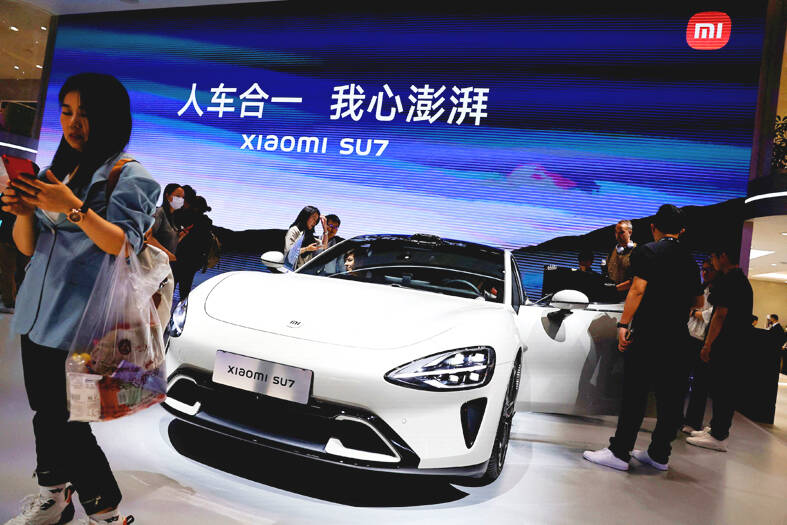Chinese electric vehicle (EV) maker Xiaomi Corp (小米) said it would cooperate with a police investigation into a fatal crash involving one of its cars, which had been in autonomous mode just before the accident.
Three college students died on Saturday night after their Xiaomi SU7 hit a concrete barrier on a section of the Dezhou-Shangrao Expressway in China’s Anhui Province.
Before the crash, the vehicle was in Xiaomi’s Navigate On Autopilot assisted driving mode, traveling at 116kph, a company statement posted online showed.

Photo: Reuters
While travelling on a highway section with roadworks, the vehicle detected an obstacle ahead, issued a warning and handed control to the driver, Xiaomi said.
However, seconds later, the vehicle hit a barrier at about 97kph.
Footage posted online showed a car in flames on the highway and later the burned-out wreckage.
Xiaomi founder Lei Jun (雷軍) said in a social media post late on Tuesday that he was “heavy-hearted” and that his company would “continue to cooperate with the police investigation.”
Since the crash, many have questioned Xiaomi’s assisted driving functions, why the car caught fire and whether the doors could be opened in an emergency.
On Sina Weibo, an account identified by the platform and local media as the driver’s mother accused Xiaomi of failing to contact her and “not taking the lives of three kids seriously.”
“As family members, we have many questions. Why did the vehicle catch fire after hitting the barrier?... We just want an explanation,” the woman wrote.
Xiaomi, a consumer electronics giant selling goods from smartphones to vacuum cleaners, launched the SU7 in March last year as it entered the auto sector.
It sold more than 200,000 units in its first year, with the standard model priced at about 210,000 yuan (US$28,935).
The company’s share price yesterday dropped 3 percent in Hong Kong, extending Tuesday’s fall of more than 5 percent.
Xiaomi last month raised this year’s delivery target for EVs to 350,000 units after posting its fastest revenue growth since 2021.

KEEPING UP: The acquisition of a cleanroom in Taiwan would enable Micron to increase production in a market where demand continues to outpace supply, a Micron official said Micron Technology Inc has signed a letter of intent to buy a fabrication site in Taiwan from Powerchip Semiconductor Manufacturing Corp (力積電) for US$1.8 billion to expand its production of memory chips. Micron would take control of the P5 site in Miaoli County’s Tongluo Township (銅鑼) and plans to ramp up DRAM production in phases after the transaction closes in the second quarter, the company said in a statement on Saturday. The acquisition includes an existing 12 inch fab cleanroom of 27,871m2 and would further position Micron to address growing global demand for memory solutions, the company said. Micron expects the transaction to

Vincent Wei led fellow Singaporean farmers around an empty Malaysian plot, laying out plans for a greenhouse and rows of leafy vegetables. What he pitched was not just space for crops, but a lifeline for growers struggling to make ends meet in a city-state with high prices and little vacant land. The future agriculture hub is part of a joint special economic zone launched last year by the two neighbors, expected to cost US$123 million and produce 10,000 tonnes of fresh produce annually. It is attracting Singaporean farmers with promises of cheaper land, labor and energy just over the border.

US actor Matthew McConaughey has filed recordings of his image and voice with US patent authorities to protect them from unauthorized usage by artificial intelligence (AI) platforms, a representative said earlier this week. Several video clips and audio recordings were registered by the commercial arm of the Just Keep Livin’ Foundation, a non-profit created by the Oscar-winning actor and his wife, Camila, according to the US Patent and Trademark Office database. Many artists are increasingly concerned about the uncontrolled use of their image via generative AI since the rollout of ChatGPT and other AI-powered tools. Several US states have adopted

A proposed billionaires’ tax in California has ignited a political uproar in Silicon Valley, with tech titans threatening to leave the state while California Governor Gavin Newsom of the Democratic Party maneuvers to defeat a levy that he fears would lead to an exodus of wealth. A technology mecca, California has more billionaires than any other US state — a few hundred, by some estimates. About half its personal income tax revenue, a financial backbone in the nearly US$350 billion budget, comes from the top 1 percent of earners. A large healthcare union is attempting to place a proposal before